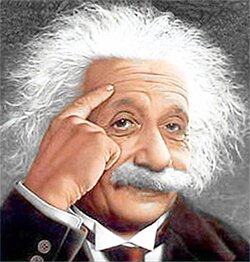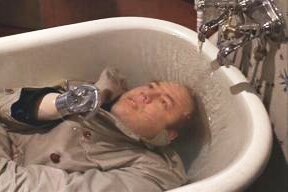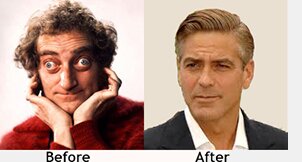   |
|
Who Will You Be In The Afterlife? Imagine yourself at age 21 meeting yourself at age 35. Would the two of you identify more or less with each other compared to people of your respective ages? What about your selves at ages 35 and 50, or 50 and 65? Many people would be more simpatico with people of their own age, and that number increases when the age differential of their selves is extended. For many of us, our conscious adult lives are composed of two or more different people.
Cyborg & Android Afterlives By cyborg, I mean the biological brain installed into a robotic physique. By android, I mean a robot whose “brain” technologically replicates content of a mind of a human being.
Consider the fact that most theoretical physicists peak before they are 35. Vitality cannot be the cause here. The simple explanation is that by age 35 their minds finally become so occupied with the current state of science that they can no longer see beyond it. The Albert Einstein of the patent office and the Albert Einstein of Princeton University could well have been different people. For most of us, the metamorphosis to cyborg or android would ideally occur between ages 40 to 50. The fact that our physical bodies can die suddenly at anytime further argues for early metamorphosis. But what would this mean for the body? For cyborg conversion, the body could be discarded because legally life is equated with brain life. For android conversion, the likely scenario is that those who can afford it will live out their biological lives while creating androids embodying as many individuals in their lives as possible. Christian Afterlives: Soul Only or Body and Soul
As for those who believe we are souls and bodies, admission to the afterlife is limited to the persons we are at death. Hence the Christian televangelist can proclaim, “Important in life isn’t a bad start but a good ending.” It’s a theme repeated throughout Christian literature, most notably by St. Augustine recalling a prayer of his younger years: "Grant me chastity and continence, but not yet.” Augustine the young man and Augustine the saint were different people. Western religion tells us that the soul is immutable. At death, the body goes the way of “ashes to ashes, dust to dust,” but what happens next to the soul depends on the belief of the faithful. Many modern Christians believe the soul goes straight to Heaven (or Hell, etc.) fully conscious. Others are true to scripture and early Christian doctrine that speak of the “resurrection of the dead.” God, wrote St. Paul, “hath appointed a day, in which he will judge the world . . .” and “. . . there shall be a resurrection of the dead, both of the just and unjust." Resurrection of the dead raises the question: What is the state of the soul in the interim between death and resurrection? The prevailing opinion is that it exists in an unconscious state; when resurrected, the soul is the being it was at death. The most controversial aspect of resurrection holds that the body recomposes and reunites with the soul. But body or no body, the resurrected are, more or less, who they were at death. The intriguing problem raised by resurrection of the dead is what we will be in the afterlife, not only who. Imagine regaining consciousness to find you are among people awakening from every period in history. How could today’s I-Phone dependent millennial begin to relate to a 16th Century Puritan? Indeed, our dependency on technology is so accelerating that it is redefining what it is to be a human being. If human dependency on technology increases at a rate comparable to technology’s development, my adult great grandchildren will be a different species. 
Technology And Who We Are
This argument is also consistent with the belief that we are bodies only. The exponential rate of technolog doubles every two years—makes many today believe cyborg and/or android afterlives will be possible in their lifetimes. And if not, their bodies can be cryogenically preserved until it is. The problem here is that technology is only half the equation. Developing technology to host a biological brain depends on possessing the biological expertise to transplant a brain into a robot. Programming hardware to replicate a human mind requires the ability to extract a biological mind’s content. Moreover, the brain is not the sole province of the biological mind. For instance, a violinist often needs to start at the beginning of a piece to play it. This is because he is recalling it from body memory. Biology's Answer: Replacing Old Body with New Achieving cyborg or android afterlives will depend as much, if not more, on the advancement of biological science as it will on the advancement of technology. With the advent of cryogenic preservation in the 1960s, biological science has been regarded as a way to lasting— if not everlasting—life. Freeze the body and store it until biological science can revive and cure it, and then live as long as biological science can carry you or until you suffer irreparable injuries. Even brains alone have been cryogenically frozen for transplant into someone else’s body or into a clone of their own or someone else’s body.
Mysticism Makes Sense But this possibility aside, the high price of admission to the soulless afterlife—whether it be biological, cyborg, android, etc.—invites considerable social opposition. Organized religion is bound to demonize those who pursue it. So too will atheists unable to afford it. Who would want a society in which their children or grandchildren must compete against people with superior physical attributes and decades of more experience? Those contemplating the soulless afterlife must be concerned not only with whom they want to be, but with whom society will allow them to be. More important, even if we can be anyone in any afterlife we want, so what? Since Descartes’ “I think therefore I am,” Western culture has fixated on individuality. Today we find individuality hard put to endure a modern 78-year-old lifetime, let alone eternity. If there is an eternal element to human beings, it is not their individualities. More and more, the mysticism of a neo-Platonist like Plotinus seems logical—to wit: our spirits emanate from “The One.” They inhabit the physical world and, upon the body’s death, return to be absorbed by The One. “No life lasts forever,” wrote the poet Swinburne. “Dead men rise up never. But even the weariest river winds somewhere safe to sea.” Related Term: Star System |



 Think of it: awakening in a young body of a David Beckham or Gisele Bündchen! Given the choice, who would prefer his or her own body to one far more attractive? And once that attractive body begins losing its looks, who would not want to replace it with another in its prime?
Think of it: awakening in a young body of a David Beckham or Gisele Bündchen! Given the choice, who would prefer his or her own body to one far more attractive? And once that attractive body begins losing its looks, who would not want to replace it with another in its prime? Countess Elizabeth Bathory de Ecsed aka The Blood Countess or The Bloody Lady of Cachtice.
Countess Elizabeth Bathory de Ecsed aka The Blood Countess or The Bloody Lady of Cachtice.